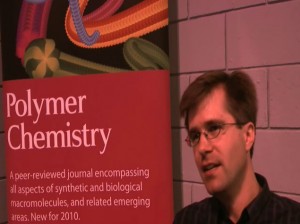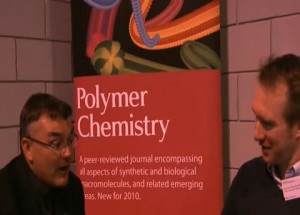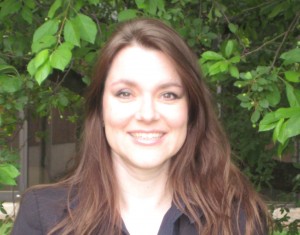 Jan van Hest is the head of bio-organic chemistry group in Radboud Univeristy Nijmegen. His group finds its inspiration in natural materials and processes and their aim is to develop smart hybrid materials based on peptides and proteins, using a variety of synthetic techniques, such as proteinengineering, peptide synthesis and controlled polymerization methods. Besides, they are developing mimic natural synthetic processes by miniaturisation of reaction environments using microsystem technology (Process on a Chip), and by compartmentalization of biocatalysts in polymeric capsules (polymersomes). Recently, Jan is awarded a VICI grant from The Netherlands Organisation of Scientific Research (NWO). Please follow the links to find more information on his research group and his recent paper in Polymer Chemistry.
Jan van Hest is the head of bio-organic chemistry group in Radboud Univeristy Nijmegen. His group finds its inspiration in natural materials and processes and their aim is to develop smart hybrid materials based on peptides and proteins, using a variety of synthetic techniques, such as proteinengineering, peptide synthesis and controlled polymerization methods. Besides, they are developing mimic natural synthetic processes by miniaturisation of reaction environments using microsystem technology (Process on a Chip), and by compartmentalization of biocatalysts in polymeric capsules (polymersomes). Recently, Jan is awarded a VICI grant from The Netherlands Organisation of Scientific Research (NWO). Please follow the links to find more information on his research group and his recent paper in Polymer Chemistry.
What was your inspiration in becoming a chemist?
From the very moment I was taught chemistry I was intrigued by molecules and materials. The fact that chemistry is all around you and that it can be used to explain the properties of every single object motivated me to find out more about this discipline. In particular the interface between chemistry and biology was something that drew my attention. Since then I have only become even more fascinated by this topic.
What was the motivation behind the research in your recent Polymer Chemistry paper where you have discussed shedding the hydrophilic mantle of polymersomes?
This research started as a discussion with some of my colleagues with whom I collaborate in a drug delivery project. The question that arose was to what extent a drug delivery vehicle had to be PEGylated to have stealth-like properties. A fully PEGylated surface could have a negative effect on the uptake efficiency, whereas if not enough PEG was located on the periphery problems could arise with capsule stability. As synthetic polymer chemists we then decided to answer this question by creating a polymersome of which we could remove part of the PEG layer in a controlled fashion. The fact that we could go as far as 5% (and even further) was a real surprise to us.
Why did you choose Polymer Chemistry to publish your work?
Polymer Chemistry is an exciting new journal which deals with the latest developments in macromolecular science. It has attracted much attention since its start, and I see that many of my colleagues use the journal to highlight their latest results
In which upcoming conferences may our readers meet you?
I will be in Bilbao, Spain, from 21-25 April at the large nanoscience conference. I also will participate in the Nanotech 2011 in Boston in June.
How do you spend your spare times?
My wife and I like to spend our holidays abroad, going from one place to the next and experience both the culture and nature of a country.
Which profession would you choose if you were not a scientist?
Difficult question. As a child I used to the say I wanted to become a lawyer, but I guess my present profession fits me much better















